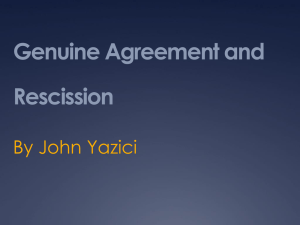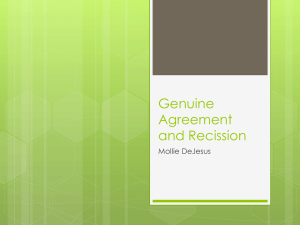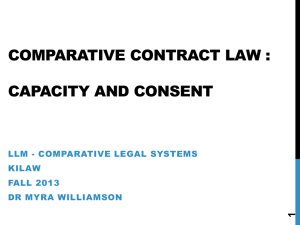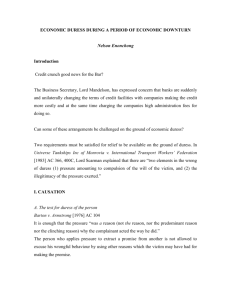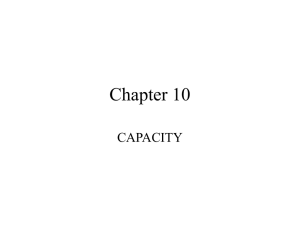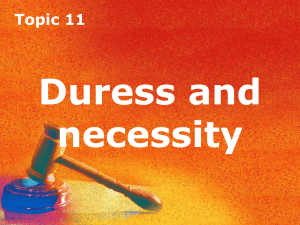7_-_defective_contracts_2
advertisement
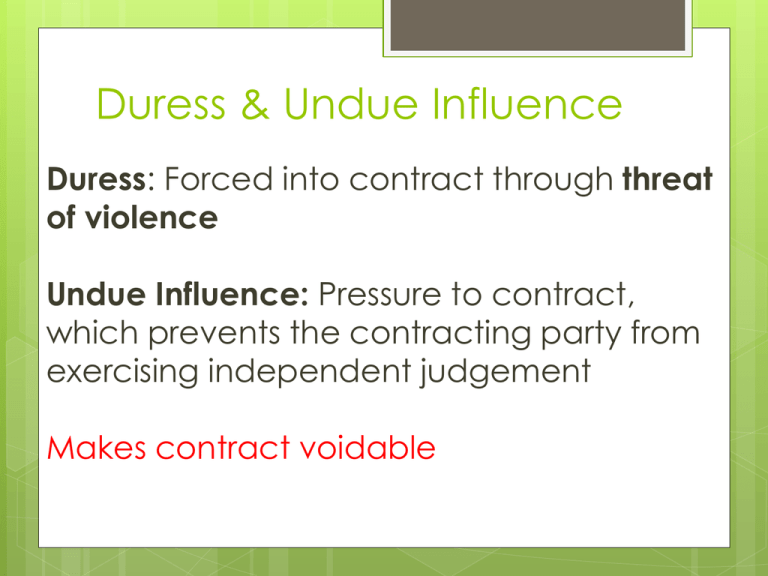
Duress & Undue Influence Duress: Forced into contract through threat of violence Undue Influence: Pressure to contract, which prevents the contracting party from exercising independent judgement Makes contract voidable Types of Duress Physical Duress “Your money or your life” Economic Duress 1. Wrongful or improper threat: A threat to breach a contract "in bad faith" or threaten to withhold an admitted debt "in bad faith". 2. Reasonable alternative (but to accept the other party's terms): an available legal remedy, an available market substitute (in the form of funds, goods, or services), or any other sources of funds this element is not met. 3. The threat actually induces the making of the contract. This is a subjective standard, and takes into account the victim's age, their background (especially their education), relationship of the parties, and the ability to receive advice. 4. The other party caused the financial distress. The majority opinion is that the other party must have caused the distress, while the minority opinion allows them to merely take advantage of the distress. Threat of violence Actual or threatened violence causing death or bodily harm, or actual or threatened unlawful imprisonment against the contracting party or member of his/her family. Three 1. 2. 3. tests for physical duress: Illegitimate means of persuasion was used Illegitimate means used was a reason, not the reason Evidence is ‘honest and accepted’. Duress can be “a” reason Barton v Armstrong [1975] A threatened B with death if he did not agree to purchase A’s shares in the company. B, also thinking that it was a wise decision, entered into the contract, but subsequently changed his mind. Duress Requirements 1. The threat must be of serious bodily harm or death 2. The threatened harm must be greater than the harm caused by the crime 3. The threat must be immediate and inescapable 4. The defendant must have become involved in the situation through no fault of his or her own Duress to goods Skeate v Beale (1840) Landlord threatened to sell furniture if he did not receive the rent. Economic Duress refined defined Economic duress forces the other to vary the contract based on a monetary disadvantage. Pau Lord On v Lau Yiu Long [1980] Scarman: “a coercion of will, such that there was no true consent… it must be shown that the contract entered in to was not a voluntary act.” Economic Duress The Sibeon and The Sibotre [1976] Kerr J: “...if I should be compelled to sign a lease or some other contract for a nominal but legally sufficient consideration under an imminent threat of having my house burnt down or a valuable picture slashed through without any threat of physical violence to anyone, I do not think that the law would uphold the agreement... The true question is ultimately whether or not the agreement in question is to be regarded as having been concluded voluntarily.” Tests for economic duress Was there objection by victim? Was there an alternative course of action other than to give in to the pressure? Was Did the victim independently advised? the victim take steps to avoid it? Affirmation North Ocean Shipping v Hyundai Construction (The Atlantic Baron) [1979] QB 705 The defendants agreed to build a ship for the claimants for a certain price specified in US dollars. After entering the contract the US dollar was devalued by 10%. The defendants threatened not to complete unless the claimants paid an additional 10% on the contractually agreed price. The claimants had a valuable charter lined up so agreed to pay the additional sums and did pay them without protest. 8 months after delivery of the ship the claimants brought an action to recover the additional sums paid. Undue Influence Taking advantage of a position of power over another person. Makes a contract voidable Royal Bank of Scotland plc v Etridge [2001] Husband convinced wife to put the house up as security for a loan to pay off business debt. Husband lied about amount needed and how badly the business was doing. Constructive notice? Williams v Bayley (1866) Son forged father’s name on promissory note for loan. The bank put pressure on father to put up his property for payment. Positions of Power and Trust Parent/child Priest/member of parish Lawyer/client Doctor/patient Illegality A contract to commit crime, tort or fraud Everet v Williams (1725) Everett claimed he was in the business of selling silver, rings and watches. When Williams asked to be taken into partnership, Everett agreed. After dealing together for some time, they had a disagreement over their respective shares of the profits. Everett claimed that Williams was not keeping to the contract and was holding onto more than his proper share. Illegality (2) Cowan v. Milbourn (1867) Contract to lease a lecture-room was breached when the landlord discovered that the lectures were going to be against Jesus. Blasphemy was illegal at that time and the Courts said, “Christianity is part of the laws of England” Contractual Incapacity The inability to understand that a contract is being made and to understand its terms, due to mental or physical reasons. Minors Insanity Intoxication (rare) Minors Generally can’t enter into contracts Was 21 until 1969… now 18 Three types of contracts for minors 1. Enforceable - Contracts which are binding on minors. 2. Voidable - Contracts which are binding on minors unless the minor repudiates the contract. 3. Unenforceable - Contracts not binding on minors unless ratified. Enforceable contracts A minor is only liable for a contract of necessaries, and for a beneficial contract of service. Necessary goods: “Goods suitable for his condition in life, and to his actual requirements at the time of sale and delivery” Necessary is NOT necessity E.g., Latest Apple student for Business of Graphic Design student Necessary Test To identify whether something is a “necessary” one has to ask two questions: 1. 2. Is the article capable of being a “necessary” in the eyes of the law Is the article a “necessary” for this minor. If the first question must first be answered in the affirmative Minors Chapple A v Cooper (1844) young widow was sued successfully for the funeral expenses for her late husband, as these services were regarded as necessaries Unenforceable Contracts Fawcett v Sethurst (1914) Well-off 20 year old hired a car to transport his luggage Terms of contract stated that the minor would be held absolutely liable for any damage to the car, regardless of how the damage was caused Held: Onerous contract
